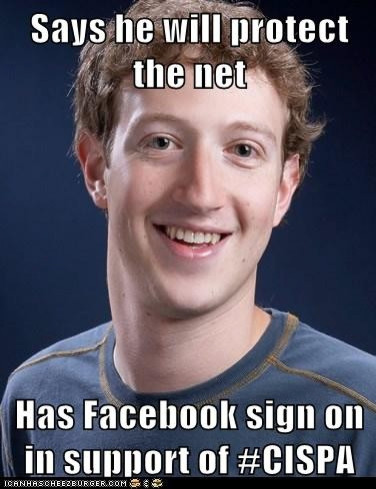Facebook Supports CISPA: How Controversial Internet Privacy Bill Could Affect You

Facebook has signed on in support of the Cyber Intelligence sharing and Protection Act (CISPA), a controversial new Internet privacy bill would make it easier for government intelligence agencies and private firms to exchange information regarding potential and emerging cyber-security threats.
Demand Progress, a civil liberties lobbyist group, has created an online campaign to combat CISPA lobbyists and demand that Facebook withdraw its support of the new bill. Demand Progress's concerns over CISPA have been mirrored by other Internet privacy advocates.
CISPA has a very broad, almost unlimited definition of the information that can be shared with government agencies and it supersedes all other privacy laws, said the Center for Democracy and Technology. Once [information] is shared with the government, it wouldn't have to be used for cybersecurity, but could instead be used for other purposes.
The Center for Democracy and Demand Progress's interpretation was echoed by the Electronic Frontier Foundation, one of the leading Internet rights advocates. The broad language around what constitutes a cybersecurity threat leaves the door wide open for abuse. For example, the bill defines 'cyber threat intelligence' and 'cybersecurity purpose' to include 'theft or misappropriation of private or government information, intellectual property, or personally identifiable information,' said the EFF in a written statement. ...An ISP could even interpret this bill as allowing them to block accounts believed to be infringing, block access to websites like The Pirate Bay believed to carry infringing content, or take other measures provided they claimed it was motivated by cybersecurity concerns.
Those that oppose CISPA commonly compare it to the Stop Online Piracy Act (SOPA) and Protect IP Act (PIPA), two controversial bills that many in the tech community alleged to have gone far beyond the bounds of reasonable governance. In short, PIPA and SOPA were accused of restricting the freedom of Internet users. The backlash led to a day of website blackouts across some of the most popular sites on the Internet.
CISPA has not caused as much of a backlash as SOPA and PIPA once had, but several Internet freedom advocacy groups are urging people to read the CISPA bill because it's so short. If moved enough to take actions, advocacy groups are asking individuals to contact their representatives to voice their opinions. You can also sign a petition to Mark Zuckerberg created by Demand Progress by visiting the group's website.
© Copyright IBTimes 2025. All rights reserved.




















